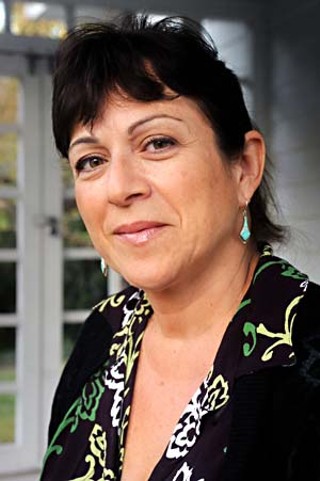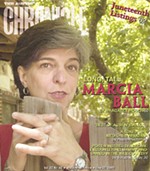Her Fair Ladies
Cristina García's antidote to the 'spicy señorita'
By Belinda Acosta, Fri., Nov. 26, 2010

Novelist Cristina García has surrounded herself with big women: women with the capacity to love large and fall hard, like Celia in García's debut novel, National Book Award finalist Dreaming in Cuban (1993); charismatic women like Reina in The Agüero Sisters (1998); and determined women like Chen Fang in Monkey Hunting (2004). In The Lady Matador's Hotel, her recent and perhaps most lyrical novel, García employs her signature use of interrelated characters, centering the action around one Suki Palacios. While "lady" conjures images of gentility and lace, Suki is no hothouse flower. A matadora who has traveled from Los Angeles to an unnamed Central American nation to become the first champion of the Lady Matadors in the Americas, Suki is breathtaking in her serene fierceness – much like García herself.
Barely clearing 5 feet, with a girlish voice and a friendly smile, García nods in agreement during a recent Austin meeting when asked about the dynamic women she's created in the course of writing five novels.
"I love these Amazon women," she laughs lightly. "I always have at least one woman [like Suki] in my books, a woman who owns her sexuality."
But García's women are not the "spicy señoritas" of pop culture. Suki in particular is highly self-possessed, a strong woman functioning effortlessly in a male domain while maintaining an arresting female sensuality. That sensuality is as matter-of-fact as the conversations Aura, another character in the book, has with her dead brother.
"Do all Latino writers have to use magical realism?" an audience member asked García with a slightly challenging tone at a recent event for the Big Read, a project of Austin Community College. García had just read a "ghost" scene from The Lady Matador's Hotel.
"Latino writers are not the only ones that use ghosts or the fantastic," she said. "Shakespeare used ghosts. Look at Kafka's The Metamorphosis."
García speaks with candid forcefulness, something her students at the University of Texas must appreciate. This semester, she's been a visiting professor of fiction at the University of Texas' Michener Center for Writers, teaching a first-year Master of Fine Arts seminar on political literature. Since The Lady Matador's Hotel release this September, she's divided her time between teaching, book promotion, and weekend getaways to visit her husband, who teaches in the music department at Texas Tech University. Next spring, Lubbock will be García's new academic home base; she's accepted a teaching position in Texas Tech's creative writing department, where she will teach each spring semester, leaving her free to travel (she still has a home in New Mexico) and write – a dream scenario for any working writer.
The Lady Matador's Hotel is García's fifth novel, the latest in a series of books that explore Cuba and Latin America as a place, as a political hotbed, as memory, but mostly as an omniscient character with a nonspeaking role. Family is another recurring theme, something García examines with deep and startling clarity in her first book of poetry, The Lesser Tragedy of Death, released last spring by Black Goat. The particular challenge for García in writing the poems was expressing the reality of living with her emotionally troubled brother. The Lesser Tragedy of Death may be her most astonishing work to date, yet it is the work she is least willing to talk about.
"I've been low-key about it," García admits. "The poems are deeply personal. When I sat down to write them, I decided to write as if there were no one looking over my shoulder."
The resulting poems are unflinching and emotionally harrowing, yet breathtakingly beautiful. García says the act of writing them filled her with both anxiety and relief – a dichotomy that is reflected in the experience of reading them.
"The anxiety comes from wondering if I've betrayed my brother and my family, if I'm unfairly trafficking in family secrets." But the relief comes in knowing "that everything I wrote is emotionally true."
Still, that did not quell her unease when her father returned two of the poems she'd inadvertently left behind on a visit.
"I assumed he read them. Would he be angry, shocked?" she recalls wondering. "When I asked him if he read them and how he felt, he said, 'We did the best we could.'"
And García could say the same.
Cristina García will read Thursday, Dec. 2, at 7:30pm in the Avaya Auditorium (ACES 2.302) on the University of Texas campus.








